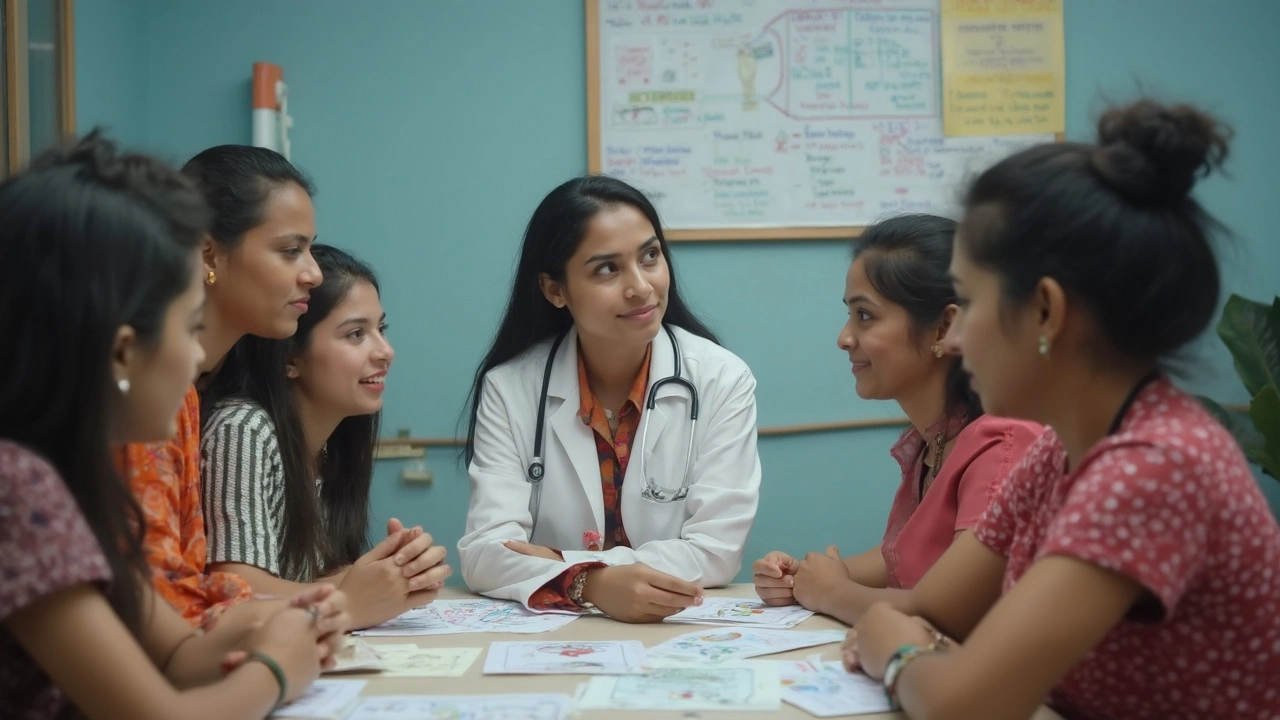IVF feels like the golden ticket for couples struggling to have a baby, but the reality? Not everyone makes it past the gate. Clinics don’t talk about it much, but there’s a checklist you need to meet before they even get started with the injections and appointments.
Maybe you’ve heard stories of people turned away or read scary forum threads about hidden rules. A lot of that is based on actual clinic criteria—not just random opinions. Age is a huge one (not just for women, by the way), and there are health issues that make IVF either risky or just not likely to work. Sometimes the little things, like your BMI or even a smoking habit, can tip the scales the wrong way.
If you’re looking for hope, don’t panic. Knowing what counts as a deal-breaker is actually a plus—you’ll waste less time and money, and you can focus on fixing what’s in your control. I’ll break down the real disqualifiers and bust a few myths I wish someone had told me and Anjali before our own IVF consults.
- Age and Ovarian Reserve: The Biggest Deal-Breakers
- Medical and Genetic Conditions that Raise Red Flags
- Lifestyle Choices: More Than Just a Lecture
- Clinic Policies: Not All Rules Are Medical
Age and Ovarian Reserve: The Biggest Deal-Breakers
This part is blunt but honest—age is the first thing any IVF disqualification checklist looks at. Clinics use strict age cutoffs, and it’s almost always based on female age. Most clinics in India put the upper age limit for women at 45, but many prefer not to start IVF treatment after 42. Why? The chance of getting pregnant drops fast after 35, and after 40, the numbers dip even more.
It’s not just about a birthday on your ID. The real deal-breaker is something called ovarian reserve. That’s the number and quality of eggs left in your ovaries. Doctors check this with a few blood tests (like AMH and FSH) and an ultrasound to look at how many egg sacs (follicles) you have. If your ovarian reserve is low, even fancy science can’t pull off miracles—no eggs, no baby.
| Age | Typical IVF Success Rate Per Cycle |
|---|---|
| Under 35 | 40-50% |
| 35-37 | 30-35% |
| 38-40 | 20-25% |
| 41-42 | 10-15% |
| 43+ | Below 5% |
Guys, you get checked too, but age matters much less for men. Sperm quality does drop if you’re older than 45, but there’s no strict male age cutoff for most IVF criteria.
- If you’re under 40, have a good egg count, and no weird test results, you’re in a strong position.
- Low AMH or very high FSH levels make clinics nervous. Some won’t even start treatment if numbers are really off.
- Even if you’re young, years of missed periods or heavy treatments (like chemo) can hit your ovarian reserve hard.
If your numbers look rough, don’t lose hope yet. Some clinics offer mini-IVF, egg donors, or advise trying sooner rather than later. But—and this part stings—if tests show almost no eggs left, that’s usually a hard stop for IVF eligibility. Always ask your doctor for straight answers on your own stats, not just what’s "normal" for others.
Medical and Genetic Conditions that Raise Red Flags
Doctors aren’t just being picky when they talk about health issues and IVF. Some medical and genetic problems make IVF disqualification more likely, either because the treatment probably won’t work or because it puts you or a future baby at real risk.
The list is longer than most people expect. For example, untreated cancers are an immediate stop sign. Same goes for certain autoimmune conditions (like lupus flare-ups) that make hormone treatments dangerous. If you’ve had recent heart attacks or major strokes, fertility clinics will almost always hold off—no one wants to turn a tough situation into a crisis.
Doctors also check for:
- Uncontrolled diabetes – IVF hormones can make blood sugar go wild if diabetes isn’t well managed.
- HIV and Hepatitis infections – Not always a deal-breaker, but some clinics aren’t equipped, and there’s a risk for both parents and child.
- Severe kidney or liver disease – Your body has to handle a barrage of meds. If your organs are struggling, IVF could push things over the edge.
- Genetic diseases – Carriers of conditions like cystic fibrosis, muscular dystrophy, or fragile X syndrome will be flagged for more genetic screening. If both partners have a known inherited disease, clinics may want you to try other reproductive options, like donor eggs or sperm.
Let’s talk numbers. One UK study found up to 10% of women screened for IVF were disqualified for untreated chronic health problems or risky genetic markers. It feels harsh, but it saves families from heartbreak down the line.
| Condition | Should You Worry? |
|---|---|
| Untreated Cancer | 100% disqualified until clear |
| Severe Heart Disease | Usually disqualified |
| Carrier for Cystic Fibrosis | Needs extra genetic screening |
| Stable, treated Diabetes | Often allowed with close monitoring |
The takeaway? If you know you’ve got a health issue or genetic risk, bring it up at the very start. Early honest talks with your doctor can save time, money, and sometimes even lives. And even if there’s a disqualifier, technology moves fast. A few years ago, things like HIV meant a hard no; now, some clinics have safe protocols for couples who test positive. Always ask about new options.

Lifestyle Choices: More Than Just a Lecture
It’s easy to roll your eyes when clinics start talking about lifestyle. But these aren’t just recommendations—some choices actually disqualify you from IVF disqualification. Here’s the stuff most clinics won’t budge on:
- Smoking: You already know smoking is bad for you, but it’s one of the biggest deal-breakers for both men and women. Most clinics require you to quit at least three months before treatment. Smokers are turned away more often than you’d think because nicotine wrecks egg quality, sperm count, and embryo development.
- Alcohol: We’re not talking about one glass of wine at a party. Regular, heavy drinking can actually bump you off the candidate list. Alcohol messes with your hormones and throws off ovulation, and clinics don’t like those odds.
- Drugs: Recreational drug use (think marijuana, cocaine, amphetamines) will get you a straight no from almost every program. Some clinics test for drug use as part of screening.
- BMI (Body Mass Index): Too high or too low? Either one’s a problem. Most clinics want your BMI between 18 and 35. If you’re above 35, there’s way more risk during IVF, including failed cycles. It’s not a moral judgment—it’s a safety rule.
Want a reality check? Here’s how some choices affect IVF success rates:
| Lifestyle Factor | Effect on IVF Success Rate |
|---|---|
| Active smoker | Up to 50% lower chance |
| Heavy alcohol use | Up to 2x miscarriage risk |
| BMI over 35 | 30-50% lower implantation rates |
Quick tip: most clinics will retest or review your history before every cycle, not just once. So if you’re thinking of sneaking in a cigarette or two, you’re seriously risking your chance for IVF.
If you have concerns about your weight or habits, don’t try to fake your way through—ask for help. Small, realistic lifestyle tweaks make a big difference, and clinics really do want you to succeed. Being honest about your habits now can save you months of frustration (and a lot of money).
Clinic Policies: Not All Rules Are Medical
Here’s what a lot of people don’t realize: every fertility clinic sets its own eligibility rules for IVF disqualification. And they aren’t all about blood tests or age cut-offs. Some policies are set by the clinic’s lawyers, owners, and ethics committees, not just doctors. These rules might even differ between cities—even two places five minutes apart could have totally different standards.
For starters, clinics usually have their own age caps. While medical guidelines suggest treatment for women up to 45, a private clinic may stop at 42, or even younger. Sometimes it depends on past success rates or the doctors’ comfort levels. And then there’s the controversial stuff: a handful of clinics refuse to do IVF for unmarried couples, LGBTQ+ couples, or single women—even in 2025, believe it or not.
Another snag is financial and practical requirements. Some clinics want proof of insurance or upfront payment before you even start the paperwork. A few require counseling or evidence you’ve been trying to conceive naturally for a set number of years. It can feel a bit like applying for a visa rather than healthcare.
Here’s a short list of common non-medical clinic rules that might surprise you:
- Strict age cut-offs (for both women and men)
- Minimum or maximum BMI requirements
- Drug/nicotine testing before enrollment
- Marital status or relationship length policies
- Proof of previous infertility treatments or length of infertility
- Requirement of psychological evaluation or counseling before starting
- Specific geographic catchment zones for who can enroll
In the UK, around 40% of NHS IVF clinics will only take patients who live within certain postcodes. In the US, 90% of clinics won’t start the IVF process until you show proof of payment or financing.
| Policy | How Common? |
|---|---|
| Age Limits | Almost all clinics |
| BMI Rules | About 2 out of 3 clinics |
| Mandatory Counseling | More than half |
| Proof of Relationship Status | 1 in 4 clinics |
| Certain Zip/Postal Codes | About 40% of public clinics (UK, AUS) |
So, if you’re checking out multiple clinics, don’t just ask about costs and medical stuff. Ask for their non-medical rules too. It might save you a wasted appointment. Each clinic can move the goalposts, and knowing their policy ahead of time puts you in control. That’s a detail most people overlook in their search for IVF eligibility.
